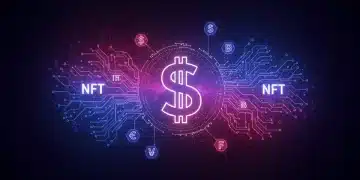NFT Royalties in 2025: Navigating New US Regulations for Creators

NFT royalties face potential shifts in 2025 due to evolving US regulations, impacting how creators monetize their digital art and potentially reshaping the NFT market landscape.
The world of NFTs is rapidly evolving, and with that evolution comes increased scrutiny and regulation. As we look ahead to 2025, one of the biggest questions on the minds of creators and collectors alike is: what will the future hold for NFT royalties in 2025: How New US Regulations Could Affect Creators?
Understanding NFT Royalties
NFT royalties are a mechanism that allows creators to receive a percentage of the sale price each time their NFT is resold on a marketplace. This provides ongoing income for artists even after the initial sale, incentivizing them to continue creating within the NFT space.
Think of it like this: when you buy a physical artwork, the artist typically only receives money from the initial sale. With NFTs, the creator can program in a royalty, ensuring they get a cut every time the NFT changes hands.
How Royalties Work
NFT royalties are typically coded into the smart contract of the NFT itself. When a sale occurs on a marketplace that supports royalties, the agreed-upon percentage is automatically distributed to the creator’s wallet. This process aims to be transparent and trustless, relying on the blockchain to enforce the terms.
Different Approaches to Royalty Enforcement
While the concept of NFT royalties is straightforward, the enforcement and implementation can vary depending on the platform. Some marketplaces enforce royalties strictly, while others offer optional royalty structures. This variability has led to debate and experimentation within the NFT community.

In conclusion, understanding the mechanics of NFT royalties is crucial for both creators and collectors. Royalties are a complex issue with a lot of different approaches being tested around the market right now.
The Current Regulatory Landscape in the US
Currently, the regulatory landscape surrounding NFTs in the US is still developing. There are no specific laws or regulations that directly address NFT royalties, leaving the industry in a somewhat gray area. However, existing laws related to securities, consumer protection, and intellectual property could potentially apply to NFTs and their associated royalties.
Federal agencies like the SEC and the FTC are beginning to take notice of the NFT space.
SEC Scrutiny
The Securities and Exchange Commission (SEC) has been investigating whether certain NFTs are being offered and sold as unregistered securities. If an NFT is deemed a security, it would be subject to strict regulatory requirements, potentially impacting how royalties are structured and distributed.
FTC Consumer Protection Concerns
The Federal Trade Commission (FTC) is focused on consumer protection in the NFT market, looking at issues such as fraud, scams, and misleading advertising. This could lead to regulations that require greater transparency and disclosure regarding NFT royalties, ensuring that buyers understand how they work.
- The lack of clarity in current tax regulations.
- The risk of inconsistent enforcement across different states.
- The potential for differing interpretations of existing laws.
Ultimately, the current regulatory landscape in the US is uncertain, with both potential benefits and risks for NFT creators and collectors. Stakeholders must engage with regulatory bodies and advocate for clear, sensible rules that foster innovation while protecting consumers.

Potential New US Regulations in 2025
Looking ahead to 2025, several potential regulatory scenarios could significantly impact NFT royalties. The evolving nature of the technology and the growing interest from governmental bodies suggest that new rules are likely to emerge.
One possibility is the establishment of clear guidelines on how NFTs are classified and regulated, addressing issues related to securities, intellectual property, and consumer protection. Another scenario involves specific legislation aimed at defining the rights and responsibilities of NFT creators, marketplaces, and buyers regarding royalties.
Legislative Action: A Possible Path
Congress could introduce legislation that provides a framework for NFT royalties, clarifying their legal status and outlining enforcement mechanisms. This could involve amending existing copyright or contract laws to specifically address the unique characteristics of NFTs. Imagine a bill that explicitly states royalty rights for creators of verifiable digital assets.
Self-Regulation and Industry Standards
Even without direct government intervention, the NFT industry could adopt self-regulatory measures to standardize royalty practices. This could involve the creation of industry-wide codes of conduct that promote transparency, fairness, and consistent royalty enforcement across different marketplaces. Certain organizations could lead the way in setting these standards.
- Greater protection for creators’ rights.
- Increased investor confidence in the NFT market.
- Reduced uncertainty for marketplaces and platforms.
In the future, whether new regulations come from legislative action or industry self-regulation, they will be an important part of the future of NFTs moving forward.
How Regulations Could Affect NFT Creators
New regulations surrounding NFT royalties could have both positive and negative effects on creators. On the one hand, clear and enforceable royalty rights could provide greater financial security and incentivize more artists to enter the NFT space. On the other hand, overly restrictive regulations could stifle innovation and make it more difficult for creators to monetize their work.
The key will be finding a balance that protects creators’ rights without hindering the growth and dynamism of the NFT market.
Potential Benefits for Creators
Well-designed regulations could provide a more predictable and reliable income stream for NFT creators, allowing them to focus on creating without worrying about royalty enforcement. This could lead to a flourishing of creativity and innovation within the NFT ecosystem. If creators know that their work is protected and that they’ll receive ongoing compensation, they will be more likely to get involved.
Potential Drawbacks for Creators
Conversely, overly burdensome regulations could create unnecessary compliance costs and bureaucratic hurdles for creators, particularly those who are just starting out. Complex rules and requirements could discourage artists from experimenting with NFTs and limit the diversity of content available. Small artists are often the most effected by rules such as these.
Ultimately, how regulations impact creators will depend on the specific details of the rules and how they are implemented. It’s important for creators to have a voice in the regulatory process and advocate for policies that support their interests.
Strategies for Creators to Adapt
Regardless of how the regulatory landscape evolves, NFT creators need to be proactive in adapting to the changing environment. This includes staying informed about new regulations, understanding their rights and responsibilities, and developing strategies to protect their income streams.
There are several steps creators can take to prepare for the future.
Diversifying Income Streams
The changing environment means creators should not rely solely on royalties as their only source of income. Exploring additional revenue streams, such as direct sales, commissions, and collaborations, can provide a more stable and resilient business model. Diversification is, and will remain, key.
Engaging with the NFT Community
Building strong relationships with collectors, marketplaces, and legal experts can help creators stay ahead of the curve and navigate the evolving regulatory landscape. Active participation in the NFT community can provide valuable insights, support, and advocacy opportunities. Strength is in numbers!
Seeking Legal and Financial Advice
Consulting with qualified attorneys or financial advisors who are knowledgeable about NFTs and blockchain technology can help creators understand their legal obligations and develop sound financial strategies. Professional guidance can provide peace of mind and help creators avoid regulatory pitfalls.
In conclusion, change can be challenging, but by staying informed, adapting their strategies, and seeking expert advice, creators can thrive in the evolving world of NFTs.
The Future of NFT Royalties Beyond 2025
Looking beyond 2025, the future of NFT royalties is likely to be shaped by ongoing technological advancements, regulatory developments, and shifts in market dynamics. As the NFT space matures, new models for creator compensation and value exchange may emerge.
There are several possible scenarios to consider.
Potential for Decentralized Royalty Enforcement
Advancements in decentralized autonomous organizations (DAOs) and smart contract technology could enable more sophisticated and automated royalty enforcement mechanisms. DAOs could be used to govern royalty policies, ensuring that they are fair, transparent, and responsive to the needs of creators and collectors alike. The technology behind this could change a lot in the future.
The Rise of Alternative Royalty Models
The NFT industry may experiment with alternative royalty models that offer greater flexibility and customization. This could include dynamic royalties that adjust based on market conditions, tiered royalties that reward long-term holders, or fractionalized royalties that allow multiple parties to share in the revenue stream. There are a lot of different approaches that the market leaders could adopt in the future.
Ultimately, the future of NFT royalties will depend on the collective efforts of creators, collectors, marketplaces, and regulators to build a sustainable and equitable ecosystem that supports innovation and creativity.
🔑 Key Concept
New Royalty Regulation Scrutiny in the US
New regulatory scrutiny on NFT royalties is expected in the US market to improve creators rights.
⚖️Potential Laws
New laws could establish clearer rules and protections for NFT royalties, defining security, intellectual property, and consumer protection.
💰Creator Adaptions
New laws could help to stabilize income stream for NFT artist, increasing profit and providing more legal protection.
📈 Decentralized Autonomy Autonomy
DAO and smart contract can advance, enabling more sophisticated and automatic royalty enforcements for creators rights..
Frequently Asked Questions
▼
NFT royalties are percentages of the sale price that creators receive when their NFTs are resold on marketplaces, providing ongoing income after the initial sale.
▼
Royalties are coded into the smart contract of the NFT. When a sale occurs, the agreed-upon percentage is automatically distributed to the creator’s wallet.
▼
A challenge is enforcing royalty payments across different marketplaces, as some platforms may not strictly enforce the agreed-upon percentages.
▼
Creators can diversify their income streams, engage with the NFT community, and seek legal advice to navigate the evolving regulatory landscape.
▼
The future may involve decentralized royalty enforcement using DAOs and smart contracts, as well as the emergence of alternative royalty models.
Conclusion
As we journey towards 2025, the landscape of NFT royalties promises to be shaped by evolving US regulations, offering both challenges and opportunities for creators. Staying informed, adapting strategies, and engaging with the community are key for navigating this dynamic environment and ensuring a sustainable future for NFT creators.
Web3 Innovations” style=”background-color: #000000; color: white; border: 1px solid #000000; cursor: pointer; padding: 8px 16px; border-radius: 8px; display: inline-block; margin: 0 auto; text-align: center; white-space: nowrap; transition: background-color 0.3s ease; text-decoration: none;”>Read more content





